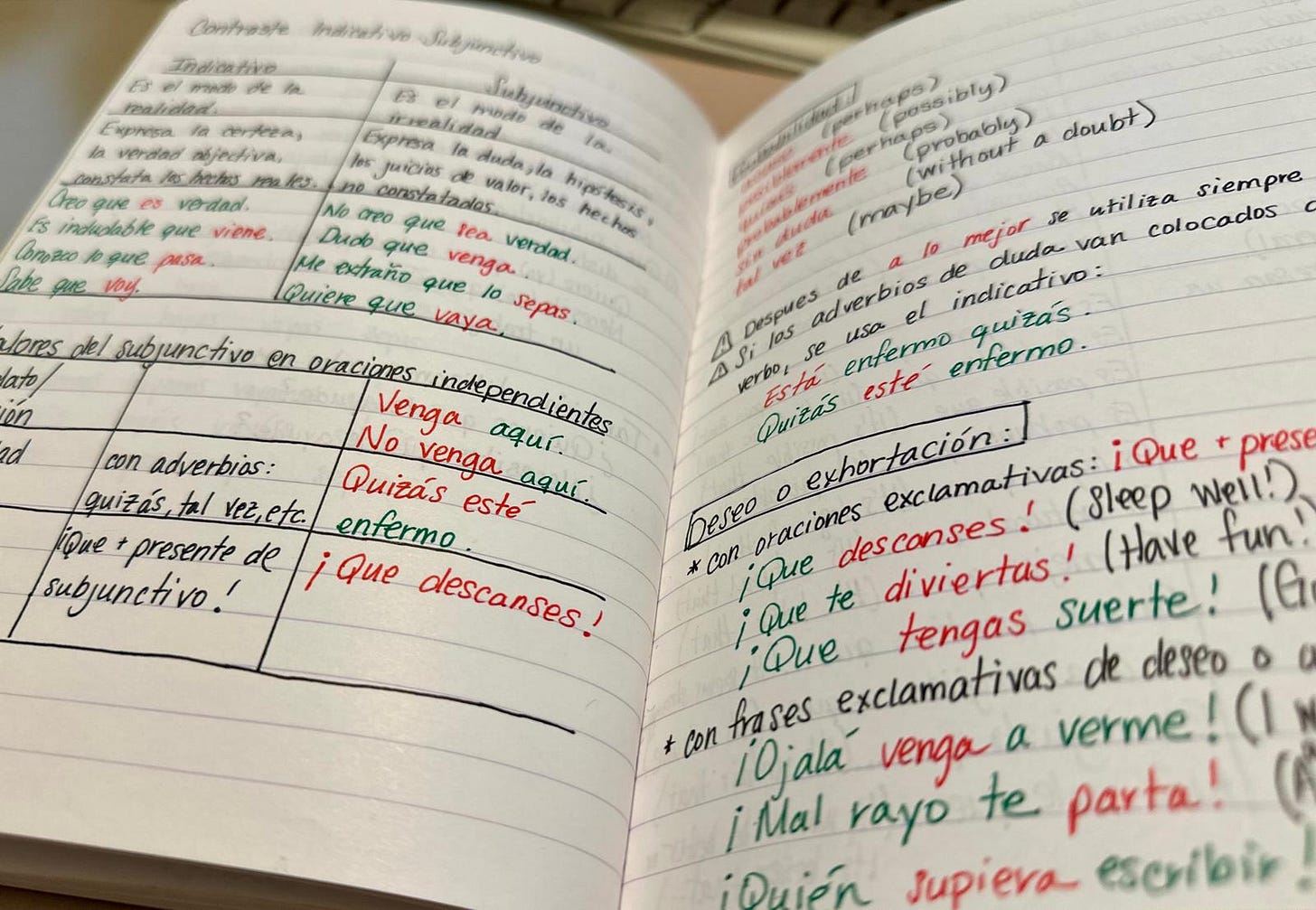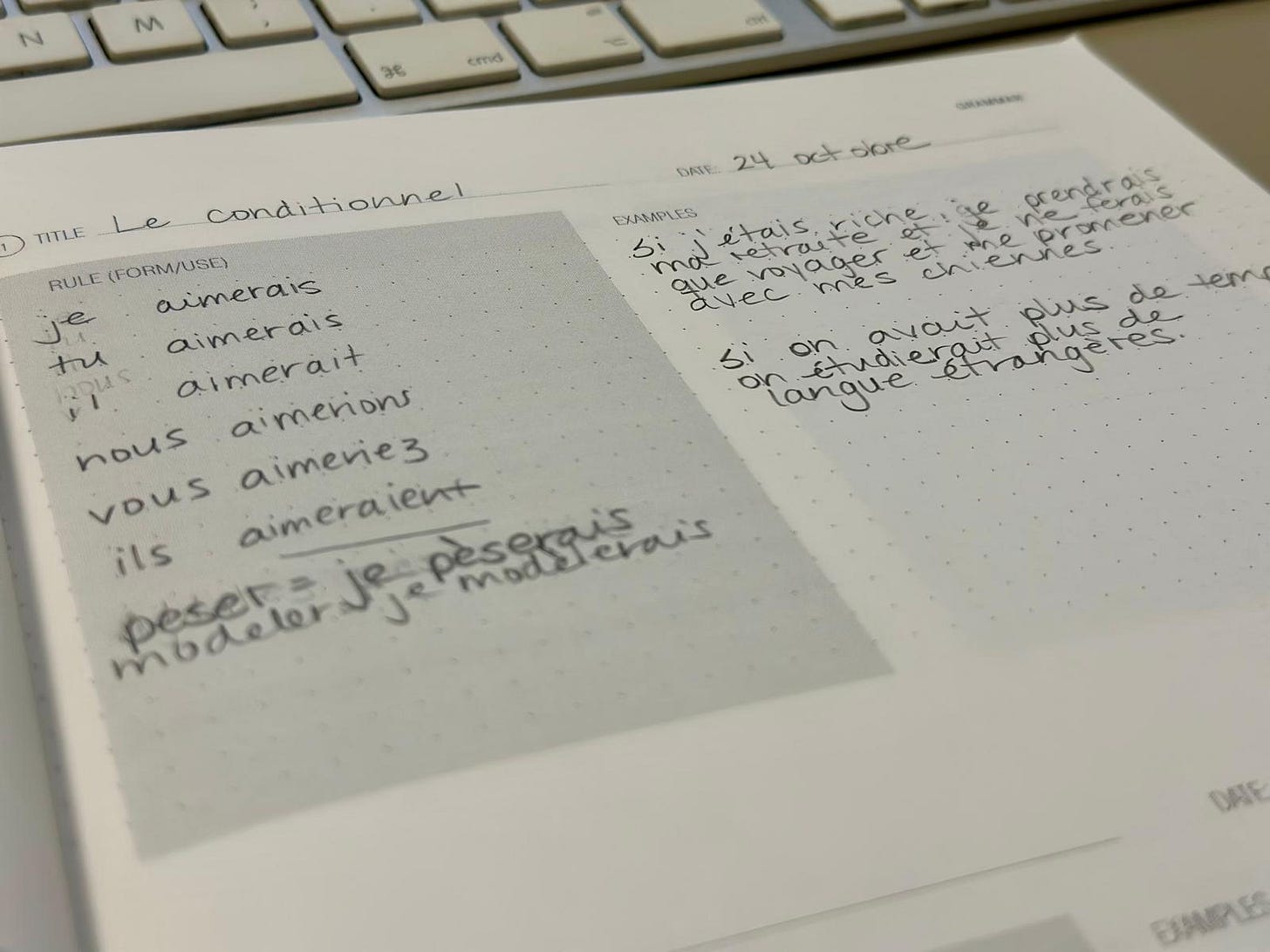There’s no single right way to learn a language. Some people thrive with structured guidance, while others prefer to chart their own course. Most of us fall somewhere in between.
Before deciding on your approach, it’s helpful to consider the pros and cons of self-study and guided learning and how each might fit into your language journey.
Defining Self-Study and Guided Learning
I see self-study as learning a language completely on your own—no classes, no teacher directing your progress. It can take many forms:
Following a structured course like Duolingo or a self-study guide.
Working through a textbook at your own pace.
Collecting your own materials and creating a personalized learning plan (like this one from Fresh Foundations).
Practicing speaking with conversation partners, tutors, or native speakers, but without a structured curriculum.
In essence, you’re in full control—deciding what to study, how to study, and how often.
On the other end of the spectrum, guided learning involves explicit instruction from a teacher, coach, or trainer. This is more like traditional classroom learning, where an expert structures the lessons and leads you through activities.
Even within guided learning, there’s a range:
Formal courses offer a clear curriculum, structured practice, and expert feedback.
Language coaching often strikes a middle ground, giving you more say in your learning direction while still providing expert guidance.
Let’s start by looking at the benefits and drawbacks of self-study.
Pros and Cons of Self-Study
Pros:
Full control – You decide what to focus on.
Flexible – Study whenever and wherever you like.
Cost-effective – No fees.
Pace yourself – Spend more time on what you need and skip what you don’t.
Access to conversation practice – If you seek out partners, you can still get speaking experience.
Cons:
Too much freedom? – It’s easy to prioritize what feels comfortable over what’s necessary.
Limited exposure – You may only engage with topics that interest you, missing out on useful but unfamiliar content.
Speaking/listening gaps – Unless you actively practice real conversations, these skills may lag.
Lack of structure – Without experience in language learning, it can be hard to know what works best.
Accountability challenges – No one is checking in, making it easy to slack off (guilty 🙋♀️).
Best for:
Maintaining a language you already know well.
Exploring a new language without major commitments.
Highly independent learners who can hold themselves accountable.
Maybe not ideal if:
You need to pass an exam but you’re unfamiliar with the task types.
You struggle with self-discipline and motivation.
You lack access to conversation practice.
Now let’s take a look at Guided Learning.
Pros and Cons of Guided Learning
Pros:
Built-in structure – Someone else organizes the process for you.
Human connection – Learning with others can be motivating (and fun!)
Speaking & listening opportunities – More real-world practice.
Expert feedback – Helps correct mistakes.
Diverse content – Exposure to topics you might not choose on your own.
Accountability – The time and financial investment can help keep you committed.
Cons:
Less flexibility – You’re on someone else’s schedule.
Not always a perfect fit – You may not connect with the teacher, classmates, or topics.
Higher cost – Especially for private courses or coaching.
Potentially limited personalization – Group classes might not fully meet your individual needs.
Best for:
Learners with a steady schedule who can commit to regular sessions.
Those who want structured support from a teacher.
People who enjoy learning with others.
Maybe not ideal if:
You need flexibility and can’t commit to a set schedule.
You’re hesitant to let someone else decide how you learn.
You prefer working alone.
You Don’t Have to Choose Just One
Language learning is a long journey, and most people move between self-study and guided learning at different stages.
I took French classes for 10 years before moving to France. The courses were useful, but not perfect. I felt they lacked the practical, everyday language I really needed.
In contrast, I learned Spanish without taking a single class. I was able to apply my knowledge of French (and the process of learning French) to my Spanish studies. I bought a grammar book, some graded readers, and got to work. Because I was living in Spain, I had plenty of speaking opportunities.

I’ve had students who joined Advanced-level courses after learning English through video games and YouTube. And I’ve met students who studied English for 10+ years in classes but struggled to make progress.
Classes aren’t necessary—but engagement with the language is.
Why I’m Self-Studying French Right Now
Despite being a language teacher and certified coach, I’m currently choosing self-study for my French learning.
Here’s why:
Flexibility. My schedule is unpredictable, and I need to fit study time in when I can.
My goal is fluency, not progress. I already have a foundation in French. Right now, I need to refresh and reactivate my skills rather than build new ones.
I know what I need. Speaking practice. Lots of it. I also need error correction, but only after I regain fluency. If I focus too much on mistakes now, I’ll get discouraged and give up.
That doesn’t mean I’ll never take another class. I probably will, when the time is right.
But one thing I know I’m missing? Speaking practice with different people.
Enter Love to Lingo Connect
I know I’m not alone in needing more conversation practice, so I’ve been planning to roll out Love to Lingo Connect at the end of February.
These aren’t traditional language classes-they’re structured exchange sessions where you can:
Practice speaking your target language in a supportive, structured environment.
Work with a partner or in small groups.
Take on the role of a language expert for another learner, helping them while learning from them.
The first session is scheduled for:
Wednesday, February 26
19:00–20:00 Madrid time
Languages: English & Spanish
Small fee to cover Zoom + hosting
For this first session, I’m looking for:
📢 4 English speakers who want to practice Spanish
📢 4 Spanish speakers who want to practice English
If it’s a success, we’ll expand to other languages!
Want to join? Send me a message and I’ll get back to you with all the details.
What has your experience been with self-study or guided learning? Which approach has worked best for you, and why? Let me know in the comments!
If you’ve found this post useful, I invite you to subscribe or share it with another language learner or teacher. Let’s support each other to become the best language learners we can be!





